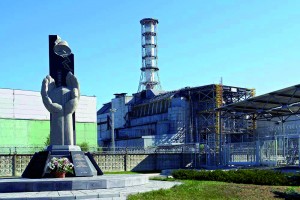MONDAY, 3 OCTOBER 2011
On 11th march 2011 a magnitude 9.0 earthquake triggered a tsunami which overwhelmed the seawall protecting the Japanese city of Fukushima. Following a power failure due to the earthquake, the tsunami destroyed the back-up cooling mechanisms for the Daiichi nuclear reactors and the subsequent reactor meltdowns released harmful levels of radioactive gases into the atmosphere. In response to the leak, the Japanese government encouraged residents within a 30 kilometre radius of the nuclear plant to evacuate or protect themselves from contact with the contaminated gases. The fires in Daiichi’s reactor four were reminiscent of those that burned for ten days at Chernobyl, the site of the only other level seven nuclear accident in history. However, such comparisons reveal more differences than similarities between the two accidents. The level of radiation released, the size of the area contaminated, and the number of people evacuated were ten times higher at Chernobyl than at Fukushima. In the case of Chernobyl, there were 64 confirmed deaths due to radiation and over 6,000 cases of thyroid cancer. Although the long-term effects of the Fukushima Daiichi accident cannot be determined at this time, there have been no deaths attributed to radiation poisoning to date.But despite these differences between Chernobyl and Fukushima, the media’s tale of these two cities has contributed to heightened public concern and precipitated anti-nuclear protests throughout the world. National representatives have responded by reconsidering policies regarding nuclear energy and the future of nuclear power plants in their country. Since the time of Chernobyl, the number of countries with active nuclear programs has proliferated rapidly and now 30 countries have developed nuclear power plants. The political responses to the Fukushima accident differed significantly from country to country: some made plans to end their nuclear programs, while others moved forward with plans to build new reactors.
In response to protesting and mounting public pressure, both Germany and Switzerland announced that they would phase out their nuclear power plants in the coming years. In a similar expression of democracy, the Italian public announced their concern in a nuclear power referendum held in June 2011, deciding to close all nuclear power plants in the future. Similarly, plans for Venezuela to build a new nuclear power station with Russian assistance were cancelled by President Hugo Chavez following the Fukushima accident. In response to the global concerns regarding the safety of nuclear energy, these countries and others will join Australia, Austria, Denmark, Greece, Ireland, Latvia, Lichtenstein, Luxembourg, Malta, Portugal, New Zealand, Norway, and Spain in the list of countries with anti-nuclear policies. For these countries, the risks of nuclear contamination outweigh the benefits of an additional energy source.
In contrast, France and the United States remain champions of nuclear energy with 58 and 104 nuclear power plants operational in 2010 respectively. China leads the way in terms of construction plans, with 26 reactors in the pipeline. Russia is also planning 10 more whilst India, South Korea, the UK, and several other countries are actively moving ahead with plans to expand their supply of nuclear energy. In June 2011, only three months after the Fukushima accident, the United Kingdom identified eight sites for the construction of new nuclear power plants. Nuclear energy provides a significant percentage of the national energy supply in several countries, including Belgium (51%), France (74%), and Slovakia (51%).
The Fukushima accident brought national policies on nuclear energy into the limelight, with nations lining up on either side of the debate. Scientific research on topics such as the safety of nuclear power plants, the environmental and social effects of radioactive contamination, and the potential of nuclear energy as a world power source has a critical role in this ongoing debate. Efforts to reduce consumption of fossil fuels and continuing national energy demands provide powerful motivators in the search for alternative energy sources. As a result, many countries have determined that the benefits of nuclear energy outweigh the risks; others exercise more caution, but see nuclear energy as a necessary stepping stone whilst alternative technologies are developed; and some, in the wake of Fukushima, have decided that the dangers are simply too great.
Rose Spear is a PhD student in the Department of Materials Science and Metallurgy

